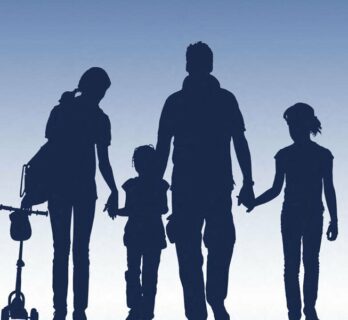News and resources
The rights of children, especially the youngest and most vulnerable, must be recalled, respected and promoted
While 460 million’enfants live in a conflict zone,’UNICEF France is partnering with a collective of’els and’ong representatives to ask, in a tribune at « Monde », for the government to define a roadmap for the implementation of humanitarian actions for early childhood.
On the occasion of the National humanitarian conference organized on December 19, 2023 and the publication of the news « humanitarian strategy » french 2023-2027, France reiterated its commitment to promote international humanitarian law to protect civilian populations and humanitarian personnel.
In addition to amounts dedicated to humanitarian assistance’ raised to 1 billion’euros per year by 2025, France announced that’elle integrates the issues related to the rights of the’enfant, to GENDER equality and the rights of women and girls, and to the climate, which we welcome. The rights of the’enfant, including the’education in an emergency situation, as well as the’ approach based on the rights of the’enfant, are now at the heart of the transversal and systematic priorities of the humanitarian response.
First victims of crises
Faced with the’ intensity of current crises and conflicts, we call on the Government to translate strategic commitments into concrete action quickly, and to ensure that the rights of children, especially the youngest and most vulnerable in crisis situations, are addressed, be recalled, respected and promoted. These commitments must be implemented through quality, multisectoral assistance tailored to the specific needs of children, including girls.
Children are the first victims of crises, be they political, climatic, humanitarian, economic, health or food. In 2023, 460 million’children were living in a conflict zone and at least 43.3 million’children were in a situation of forced displacement, according to’Unicef.
The year 2023 will unfortunately not have spared them, whether in Ukraine, the Gaza Strip, Haiti, the Democratic Republic of the Congo, Syria, etc, in Yemen or in the Horn of’Africa. Malnutrition threatens 45 million’children under 5, according to’after coordination of Humanitarian Affairs of’onU, and 250 million’children are out of school, are, according to’Unesco.
There is an urgent need to ensure the realization of all the rights of children, including the youngest living in crisis (education, health, mental health, nutrition, protection..). L’infancy – and especially early childhood (under 8 years) – is the most important development phase in the life of’a person.
Toxic stress
During this phase, physical, cognitive, social, emotional and linguistic development establishes the essential foundations for the well-being and resilience of the CHILD’. This period affects his mental and physical health, his ability to build and maintain respectful relationships with others, his learning and academic progress, and his, social and economic participation for the rest of his life.
Young children living in crisis settings face prolonged and excessive activation of toxic stress leading to negative repercussions throughout their lives. Research shows that’ access to care can mitigate these risks, and a healthy and caring relationship with the person caring for’s is the main source of resilience.
Humanitarian response services and programmes must therefore include both appropriate care and educational care for young children, as well as’a monitoring of mental health and psychosocial support for those responsible for it. This combined care of the young child and his companion remains one of the biggest gaps observed in the efforts of’ emergency intervention existing.
We welcome France’s renewed ambition for a humanitarian response and its commitment to respect the rights and needs of children. The deployment of the new strategy can fill the gaps in early childhood programmes, which remain neglected and underfunded in crisis contexts, including through through le global compact on refugees. On a global scale, early childhood development accounts for about 3% of’ development aid to crisis-affected countries, note l’Unicef, and only 2 % of the’humanitarian aid, according to a study by’ONG Moving Minds.
A driving role
France has today’ the opportunity to make a difference :
- by strengthening the’ impact of calls for projects and programmes financed by the’State by systematically taking into account the rights of young children in crisis situations ;
- by unlocking larger multisectoral funding, targeted at early childhood development, especially in a crisis context, and multi-year funding for more sustainable responses in a Nexus approach. In 2022, France devoted only 4.9% of its humanitarian aid to’education and 0.1% for the protection of children, the statement said Coordination of humanitarian affairs of’ONU ;
- by continuing efforts to ensure that local actors in early childhood development in the countries of intervention contribute to the design and management of programmes, and by improving the participation of’enfants and young people’s organisations.
France has a leading role to play in the implementation of the rights of the’enfant in a crisis context, and in the recognition of the essential needs of early childhood. These priorities must necessarily be accompanied by the implementation of concrete and impactful’actions, through a roadmap that the new government must quickly define.
List of signatories : Eleonore Caroit, deputy (Renaissance) of the French established outside France, vice-president of the commission of foreign affairs ; Louise Clement, coordinator of the Coalition Education collective ; Gilles Delcourt, director General of’ONG Action Education ; Harlem Desire, senior vice-president of the’ONG International Rescue Committee for’Europe ; Adeline Hazan, president of’UNICEF France ; Rachid Lahlou, founding president of Secours islamic France ; Melanie Luchtens, coordinator of Groupe Enfance collective ; Isabelle Santiago, member (PS) of Val-de-Marne, vice-president of the delegation to the rights of the’enfant ; Adrien Sallez, director General of the’Association Sister Emmanuelle ; Tricia Young’s, director of Moving Minds Alliance.
